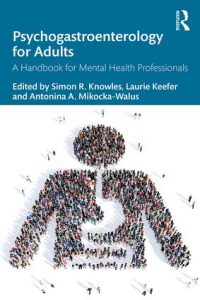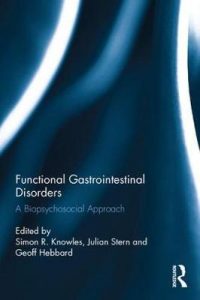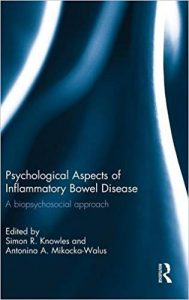Books & Book Chapters
Published Research
The following is a summary of books & book chapters by Associate Professor Knowles. Click on the references below for further details.
Books
Blank
Knowles, S. R., Keefer, L., & Mikocka-Walus, A. A. (in press; expected publication in November). Psychogastroenterology: A Handbook for Mental Health Professionals. Routledge Press. ISBN: 9780367196561.

The brain-gut connection has been increasingly implicated in biopsychosocial well-being. While there are numerous factors that directly and indirectly impact on how the gut and the brain interact, there is a growing awareness that gastrointestinal conditions need to be viewed and treated as part of a multidisciplinary approach. Psychogastroenterology for Adults: A Handbook for Mental Health Professionals is the first book to provide mental health professionals with an evidence-based, practical guide for working with patients living with gastrointestinal conditions.
Timely and accessibly written, this book provides a unique, comprehensive introduction to psychogastroenterology, offering a step-by-step guide to evidence-based psychological treatment protocols. Broad in scope and expertise, the book is divided into four parts. It opens with an overview of the field, moving on to outline psychological concerns and conditions in gastroenterological (GI) cohorts. Further, it covers various approaches to psychogastroenterology, including psychopharmacological and eHealth practices. In closing, the book looks to the future, providing guidance on supervision in psychogastroenterology, and exploring challenges in the field.
Written by experts in the field, this book will be an indispensable resource for those who wish to enhance their knowledge and practice of psychogastroenterology in the mental health profession, including psychologists, psychiatrists, psychosomatic medicine specialists, nurses and social workers.
Knowles, S. R., Stern, J., & Hebbard, G. (2018). Psychological Aspects of Functional Gastrointestinal Disorders: A biopsychosocial approach. Routledge Press. ISBN: 9781138947030.
 This book brings together world experts in the field of Functional Gastrointestinal Disorders (FGIDs) who practice an integrated and holistic approach in their care for patients to provide an up-to-date and comprehensive evaluation of a range of issues associated with the biopsychosocial treatment of FGIDs. Examining topics such as neurological and biological aspects of FGIDs, common concerns faced in relation to diagnosis, and ongoing medical decisions and interventions, each chapter provides crucial practical recommendations, as well as future directions of psychosocial work in multi-team environments. Functional Gastrointestinal Disorders considers individual conditions in detail, including the current Rome IV diagnostic criteria for FGIDs required to make a positive diagnosis, the role of psychological and other biopsychosocial and biofeedback aspects of treatment, and general recommendations with regard to diet and medications. Each chapter also provides an up-to-date consolidation and evaluation of the current literature as well as practical recommendations, which can then be applied by the reader in their own interaction with FGID patients. Topics covered include:
This book brings together world experts in the field of Functional Gastrointestinal Disorders (FGIDs) who practice an integrated and holistic approach in their care for patients to provide an up-to-date and comprehensive evaluation of a range of issues associated with the biopsychosocial treatment of FGIDs. Examining topics such as neurological and biological aspects of FGIDs, common concerns faced in relation to diagnosis, and ongoing medical decisions and interventions, each chapter provides crucial practical recommendations, as well as future directions of psychosocial work in multi-team environments. Functional Gastrointestinal Disorders considers individual conditions in detail, including the current Rome IV diagnostic criteria for FGIDs required to make a positive diagnosis, the role of psychological and other biopsychosocial and biofeedback aspects of treatment, and general recommendations with regard to diet and medications. Each chapter also provides an up-to-date consolidation and evaluation of the current literature as well as practical recommendations, which can then be applied by the reader in their own interaction with FGID patients. Topics covered include:
- the common concerns and issues faced by individuals with FGIDs in relation to pre-and post-diagnosis, ongoing medical decisions and interventions
- review of current evidence-based biopsychosocial treatment practices for each FGID condition
- the differences and challenges associated with FGIDs across individual life stages
- special topics such as the relationship with eating disorders and the role of psychotropic medications
- modern patient centred initiatives such as patient empowerment, distance and e-therapies
- the future challenges facing FGID treatment.
Throughout the entire book, common themes and practical recommendations are described. Functional Gastrointestinal Disorders, has broad applicability across multiple spheres, including treatment, research and teaching and is accessible to those working in gastroenterology and primary care alike. Forward written by Professor Douglass Drossman (President, Rome Foundation) “After reviewing the book very nicely edited by Drs. Knowles, Stern and Hebbard my interest assuredly grew. Why? Because they brought together a group of skilled academicians and clinicians with vast experience in the field who write well, and who bring to bear a comprehensive sense of what the FGIDs are all about, from a biopsychosocial perspective and in a clear and relatively concise manner.”
Knowles, S. R., & Mikocka-Walus, A. A. (2015). Psychological Aspects of Inflammatory Bowel Disease: A biopsychosocial approach. Routledge Press.
 In the Western world around 360 in every 100,000 individuals have inflammatory bowel disease (IBD), a relapsing-remitting autoimmune disease that affects the gastrointestinal tract. Its impact on individual functioning across physical and psychosocial domains is significant and psychological distress is a common feature, with research suggesting that active IBD is associated with one of the highest rates of depression and anxiety of all chronic illnesses. Despite the high prevalence of mental health co-morbidities in IBD, psychological illness remains largely undertreated, with studies showing that 60% of IBD patients experiencing mental health problems do not receive adequate help. In this book, Knowles and Mikocka-Walus bring together world experts who practice integrated and holistic approach in their care for IBD patients, to provide an overview of research across a range of topics associated with the biopsychosocial treatment of IBD. Each chapter provides an up-to-date comprehensive consolidation and evaluation of the current literature alongside recommendations for practice. Key themes include:
In the Western world around 360 in every 100,000 individuals have inflammatory bowel disease (IBD), a relapsing-remitting autoimmune disease that affects the gastrointestinal tract. Its impact on individual functioning across physical and psychosocial domains is significant and psychological distress is a common feature, with research suggesting that active IBD is associated with one of the highest rates of depression and anxiety of all chronic illnesses. Despite the high prevalence of mental health co-morbidities in IBD, psychological illness remains largely undertreated, with studies showing that 60% of IBD patients experiencing mental health problems do not receive adequate help. In this book, Knowles and Mikocka-Walus bring together world experts who practice integrated and holistic approach in their care for IBD patients, to provide an overview of research across a range of topics associated with the biopsychosocial treatment of IBD. Each chapter provides an up-to-date comprehensive consolidation and evaluation of the current literature alongside recommendations for practice. Key themes include:
- current understanding of the interrelationship of the neurological and biological aspects of IBD
- common concerns and issues individuals with IBD face
- exploring challenges across individual life-stages
- current evidence for psychosocial interventions
- recommendations for future directions of biopsychosocial work.
Psychological Aspects of Inflammatory Bowel Disease: A biopsychosocial approach is a key resource for researchers, practitioners and academics considering psychosocial aspects of the disease and psychological interventions. It will also appeal to health psychologists and mental health practitioners working with clients with IBD, as well as gastroenterologists interested in a comprehensive and holistic approach to IBD management. Foreword written by Professor Simon Travis (President of ECCO 2012 to 2014) “The editors are to be commended for assembling a group of distinguished, internationally recognised specialists who have written authorative and well referenced chapters on a range of fascinating topics. They have risen to the challenge of addressing the biological, psychological and social aspects of IBD. The book should be required reading for IBD specialists and is accessible to informed lay people who may wish to understand the state of the science in the biopsychosocial field. Read on.”
Referred Book Chapters
blank
Mikocka-Walus, A. A., Emerson, C., Olive, L., & Knowles, S.R. (2019). Common psychological issues in gastrointestinal conditions (Chapter 8). InKnowles, S. R.,&Keefer, L., &Mikocka-Walus, A. A. (in press; expected publication in November). Psychogastroenterology: A Handbook for Mental Health Professionals. Routledge Press. ISBN: 9780367196561
Keightley, P.C., &Knowles, S. R. (2019). Psychological assessment, formulation, and intervention planning in gastrointestinal cohorts with psychological issues (Chapter 10). In Knowles, S. R.,&Keefer, L., &Mikocka-Walus, A. A. (in press; expected publication in November). Psychogastroenterology: A Handbook for Mental Health Professionals. Routledge Press. ISBN: 9780367196561
McCombie, A., & Knowles, S.R. (2019). The role of eHealth in psychogastroenterology (Chapter 20). In Knowles, S. R.,&Keefer, L., &Mikocka-Walus, A. A. (in press; expected publication in November). Psychogastroenterology: A Handbook for Mental Health Professionals. Routledge Press. ISBN: 9780367196561
Knowles, S. R., &Keefer, L., Mikocka-Walus, A. A. (2019). Supervision and future challenges in psychogastroenterology (Chapter 21). In Knowles, S. R., &Keefer, L., &Mikocka-Walus, A. A. (in press; expected publication in November). Psychogastroenterology: A Handbook for Mental Health Professionals. Routledge Press. ISBN: 9780367196561
Keightley, P.C., & Knowles, S. R., & Monshet, K. (2018). Psychological assessment and questionnaires in FGIDs (Chapter 7). In Knowles, S. R., Stern, J., & Hebbard, G. edited book Functional Gastrointestinal Disorders. Routledge Press. Pages 62-70.
Knowles, S. R., & Monshet, K. (2018). Functional Bowel Disorders (IBS and Non-IBS): Stress management & Mindfulness-based approaches (Chapter 17). In Knowles, S. R., Stern, J., & Hebbard, G. edited book Functional Gastrointestinal Disorders. Routledge Press. Pages 161-169.
Knowles, S. R., & Ljótsson, B. (2018). Future directions in FGIDs – eHealth (Chapter 26). In Knowles, S. R., Stern, J., & Hebbard, G. edited book Functional Gastrointestinal Disorders. Routledge Press. Pages 251-259.
Guadagnoli, L., Knowles, S. R., Keefer, L. (2018). Patient empowerment and working with complex patients with FGIDs (Chapter 25). In Knowles, S. R., Stern, J., & Hebbard, G. edited book Functional Gastrointestinal Disorders. Routledge Press. Pages: 241-248.
Knowles, S. R., Hebbard, G., & Castle. D. (2016). Eating Disorders and the GI tract: Definition, Recognition, The Role of the Psychologist in care. Handbook on diet and the Gut. USA: World Gastroenterology Organisation.
Knowles, S. R. (2015). IBD, cancer, and its psychosocial impact (Chapter 11). In Knowles, S. R., & Mikocka-Walus, A. A. edited book Psychological Aspects of Inflammatory Bowel Disease: A biopsychosocial approach. Routledge Press.
Knowles, S. R. (2015). Psychological assessment and the use of questionnaires in IBD cohorts (Chapter 17). In Knowles, S. R., & Mikocka-Walus, A. A. edited book Psychological Aspects of Inflammatory Bowel Disease: A biopsychosocial approach. Routledge Press.
Knowles, S. R. (2015). Future directions in IBD – eHealth (Chapter 23). In Knowles, S. R., & Mikocka-Walus, A. A. edited book Psychological Aspects of Inflammatory Bowel Disease: A biopsychosocial approach. Routledge Press.
Nelson, E. A., Palombo, E. A., & Knowles, S. R. (2010). Comparison of methods for the extraction of bacterial DNA from human faecal samples for analysis by real-time PCR. Current Research, Technology and Education Topics in Applied Microbiology and Microbial Biotechnology.
Real-time PCR analysis of bacterial DNA isolated from faecal specimens has become increasingly used for the quantification of indigenous intestinal microbiota. The success of such analysis requires effective methods for the extraction of faecal bacterial DNA. Three extraction methods were assessed for their effectiveness in extracting Escherichia coli and Enterococcus spp. bacterial DNA from human faecal samples: an in-house phenol/chloroform extraction, and two commercially available kits, ExtractMaster (Epicentre Biotechnologies) and UltraClean (Mo Bio Laboratories) faecal DNA extraction kits. Real-time PCR using the standard curve method was used to quantify the level of bacterial DNA extracted from ten faecal samples. The phenol/chloroform method required an additional dilution step before DNA could be amplified by real-time PCR. After taking into account this dilution, the three extraction methods did not differ in the level of E. coli bacterial DNA detected. However, for Enterococcus, the ExtractMaster kit resulted in significantly less DNA detected. The phenol/chloroform method reliably extracted DNA, and produced extracts with short-term stability. Extraction using phenol/chloroform produces quantities of faecal bacterial DNA comparable to commercially available kits when amplified by current real-time PCR technology. Furthermore, phenol/chloroform extraction is rapid and simple, and provides a clear cost advantage for laboratories with limited funds. URL: http://formatex.info/microbiology2/1479-1485.pdf
Nelson, E.A., Knowles, S.R., Jadhava, S.R., Walsh A., & Palombo, A. E. (2014). Assessing the beneficial effects of a magnolia extract supplemented with phosphatidylserine: a randomised, double-blind, placebo-controlled clinical trial. Medicinal Plants: Phytochemistry, Pharmacology and Therapeutics, (3), p143-152. Daya Publication House, New Delhi.
Stress is common aspect of everyday life, often associated with reduced well-being. There is increasing interest in the use of natural herbal remedies for the relief of stress. The aim of the current study was to investigate the biological and psychological mechanisms underlying the beneficial effects of a propriety blend of magnolia extract and phosphatidylserine in a doubleblind, placebo-controlled, clinical trial comprising 34 healthy adults (26.09 ± 6.09 years; range 19-45). Participation took place over a consecutive 4-week period. This included a baseline period where participants did not take the herbal supplement, two experimental periods where participants were instructed to take the recommended dose of herbal supplement (two capsules immediately upon awakening), and a follow-up period where participants ceased taking the supplement. Throughout the study period, participants were required to complete a series of questionnaires assessing concentration, mood, perceived stress, anxiety,and depression. Participants also provided saliva samples on three select days during each week, to measure the biological markers of stress, cortisol and alpha-amylase. Waking cortisol levels decreased throughout the study period in the treatment group, while there was no significant change in levels for the control group. For the treatment group, the cortisol awakening response also tended to decrease throughout the study period. Paralleling this, there was a significant decrease in the daily measure of stress and the weekly measure of depression in the treatment group, with similar trends seen for the other measures of psychological well-being. There were no significant changes in well-being measures over the study period for the control group. Our study showed that a dietary supplement containing proprietary extracts of magnolia and phosphatidylserine may have beneficial anxiolytic effects through targeting the hypothalamic-pituitary-adrenal axis regulator of the stress response, with the supplement having significant beneficial effects on waking cortisol, daily stress and weekly depression. URL: https://www.researchgate.net/publication/259658067_Assessing_the_beneficial_effects_of_a_magnolia_extract_supplemented_with_phosphatidylserine_a_randomised_double-blind_placebo-controlled_clinical_trial
